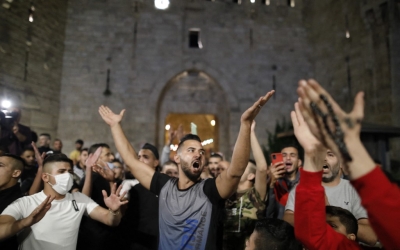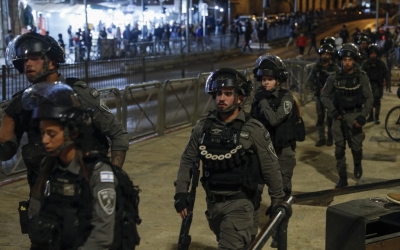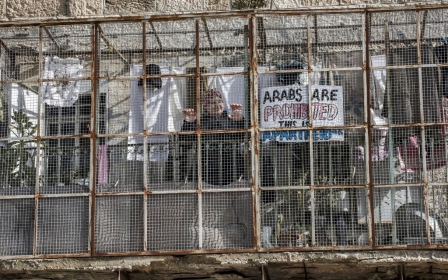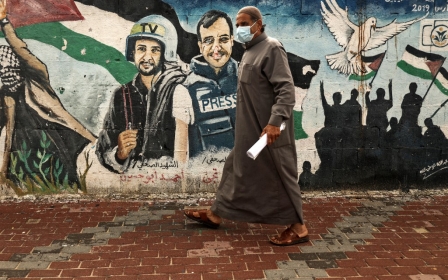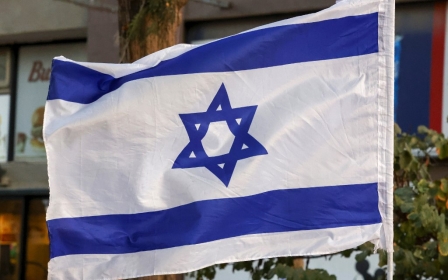Human Rights Watch: Israel commits 'crimes of apartheid' against Palestinians
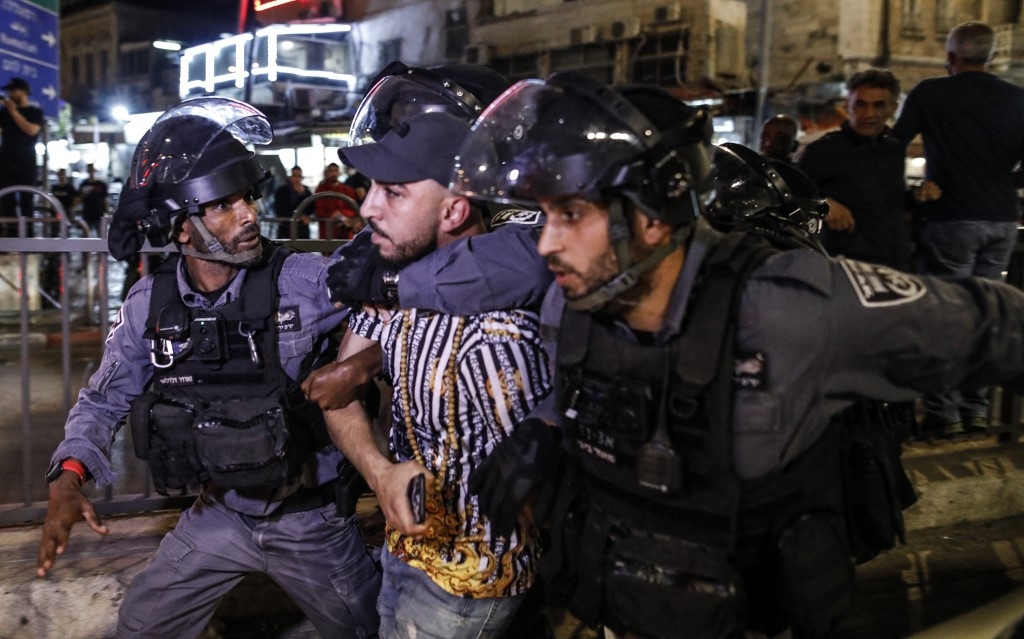
A leading human rights group has accused Israel of committing crimes of apartheid and persecution against Palestinians in the occupied territories and East Jerusalem.
Human Rights Watch (HRW), in a 213-page report released on Tuesday, said Israel's dual policies, which are codified in its laws, privilege Jewish Israelis while repressing Palestinians and had "crossed the threshold" into apartheid.
Apartheid is a universal legal term defined by international law that refers to severe institutional discrimination and systematic oppression by one racial group over another.
"The finding [in Tuesday's report] is based on an overarching Israeli government policy to maintain the domination by Jewish Israelis over Palestinians and grave abuses committed against Palestinians living in the occupied territory, including East Jerusalem," the group said in a statement on Tuesday.
'Denying millions of Palestinians their fundamental rights... is not simply a matter of an abusive occupation'
- Kenneth Roth, executive director of HRW
The report draws on years of human rights documentation, case studies, and a review of government planning documents, statements by officials and other sources, the group said.
"Prominent voices have warned for years that apartheid lurks just around the corner if the trajectory of Israel's rule over Palestinians does not change," said Kenneth Roth, executive director of HRW.
"This detailed study shows that Israeli authorities have already turned that corner and today are committing the crimes against humanity of apartheid and persecution."
The Palestinian Authority (PA) welcomed the report on Tuesday, with presidential spokesperson Nabil Abu Rudeineh calling it a “powerful testament to the struggle of the people of Palestine under Israel's belligerent military occupation and its colonial and oppressive policies”, according to official PA news agency Wafa.
Meanwhile, PA Prime Minister Mohammad Shtayyeh called on the international community to take note and act accordingly.
“The traditional situation, where many countries worldwide announce their position against occupation without actual sanctions and without revising their relations and agreements with Israel on the different diplomatic, cultural, and trade relations, can and should not continue,” he said.
Ahead of the report's release, Israel's Ministry of Foreign Affairs told Middle East Eye that the report is "a propaganda pamphlet" and slammed HRW for not sharing the document with Israeli authorities for review ahead of its publication.
"Human Rights Watch is known to have a long-standing anti-Israeli agenda, actively seeking for years to promote boycotts against Israel," the office said in an emailed statement.
"This report is yet another part of the organisation's ongoing campaign, led by a known BDS supporter, with no connection to facts or reality on the ground," it continued. "The fictional claims that HRW concocted are both preposterous and false."
'Maintaining a solid Jewish majority'
In its report, HRW noted that Israeli authorities had sought to maximise the land available to Jewish communities while concentrating most Palestinians into dense population centres.
"The authorities have adopted policies to mitigate what they have openly described as a demographic 'threat' from Palestinians," HRW said. "In Jerusalem, for example, the government's plan for the municipality, including both the west and occupied east parts of the city, sets the goal of 'maintaining a solid Jewish majority in the city' and even specifies the demographic ratios it hopes to maintain."
To meet its goals, "Israeli authorities systematically discriminate against Palestinians", the group alleged.
"The institutional discrimination that Palestinian citizens of Israel face includes laws that allow hundreds of small Jewish towns to effectively exclude Palestinians and budgets that allocate only a fraction of resources to Palestinian schools as compared to those that serve Jewish Israeli children," it continued.
HRW highlighted Israel's practice of prosecuting Palestinians in the occupied West Bank under "draconian" military law, while Jewish Israelis living in West Bank settlements are afforded "their full rights under Israel’s rights-respecting civil law", saying that alone "amounts to the systematic oppression required for apartheid".
Isreal's own military court, which solely prosecutes Palestinians, has self-reported a 99.7 percent conviction rate.
"Denying millions of Palestinians their fundamental rights, without any legitimate security justification and solely because they are Palestinian and not Jewish, is not simply a matter of an abusive occupation," Roth said.
"These policies, which grant Jewish Israelis the same rights and privileges wherever they live and discriminate against Palestinians to varying degrees wherever they live, reflect a policy to privilege one people at the expense of another."
Palestinians have been protesting dual policies concerning the Al-Aqsa Mosque since the start of Ramadan on 13 April, as Israel has limited Palestinians access to the mosque and the surrounding compound while allowing Israelis free access to the Old City.
Last year, Israel banned Palestinians from entering the mosque for the whole month of Ramadan due to the Covid-19 pandemic. However, Israeli settlers were reportedly allowed to visit Al-Aqsa at the time, escorted by Israeli security and intelligence units.
According to HRW, some of Israel's other policies that constitute severe abuses required under the universal definition of apartheid include: sweeping movement restrictions in the form of the Gaza closure and a permit regime; confiscation of more than a third of the land in the West Bank; harsh conditions in parts of the West Bank that led to the forcible transfer of thousands of Palestinians out of their homes; the denial of residency rights to hundreds of thousands of Palestinians and their relatives; and the suspension of basic civil rights to millions of Palestinians.
The group also noted the "near-categorical denial of building permits to Palestinians" and the subsequent demolition of thousands of Palestinian homes on the pretext of lacking permits - a policy that HRW said has no security justification.
'The most serious crimes'
In January, leading Israeli rights group B'Tselem also labelled Israel an apartheid state, breaking from consensus, even among Israel's left, that the country is a democracy.
"By geographically, demographically and physically engineering space, the regime enables Jews to live in a contiguous area with full rights, including self-determination, while Palestinians live in separate units and enjoy fewer rights," the B'Tselem report stated.
'When we connected the dots it became clear to us that there was an underlying reality'
- Omar Shakir, HRW
"This qualifies as an apartheid regime, although Israel is commonly viewed as a democracy upholding a temporary occupation."
B’Tselem welcomed the HRW report on Tuesday, and called on the international community to see it as “an urgent wake-up call...to finally take concrete action in rejection of apartheid and in support of human rights, democracy and justice”.
Speaking to MEE, Omar Shakir, HRW's Israel and Palestine director who has been banned from visiting Israel, stressed that rights groups "do not make determinations about crimes against humanity lightly", as they are "the most serious crimes under international law".
"One required element of the crime against humanity of apartheid is an intent to dominate. For decades, Israeli authorities insisted that the status quo, especially in the occupied Palestinian territories, was 'temporary', the result of the stalled 'peace process'," Shakir said.
"[But] the continuous expansion of Israeli-only settlements in the West Bank and significant investment in infrastructure to seamlessly connect settlements with Israel proper, the passage of the Jewish Nation-State Law, and declarations of intent to formally annex additional parts of the West Bank have clarified Israel's intent to maintain the domination of Jewish Israelis over Palestinians for the foreseeable future - if not permanently," he continued.
"When we connected the dots, it became clear to us that there was an underlying reality - a reality in which a single government rules over the area between the Jordan River and the Mediterranean Sea where two groups of roughly equal size live, methodically privileging Jewish-Israelis and systematically oppressing Palestinians," Shakir said.
Following its determination, HRW called on Israeli authorities to dismantle "all forms of repression and discrimination that privilege Jewish Israelis at the expense of Palestinians, including with regards to freedom of movement, allocation of land and resources, access to water, electricity, and other services, and the granting of building permits".
It also called on the International Criminal Court (ICC) to investigate and prosecute those credibly implicated in Israel's apartheid system.
In addition, the group urged the United Nations to establish an official commission of inquiry to investigate systematic discrimination and repression in Israel and Palestine and a UN global envoy for the crimes of persecution and apartheid with a mandate to mobilise international action to end persecution and apartheid worldwide.
"Countries should condition arms sales and military and security assistance to Israel on authorities taking concrete and verifiable steps towards ending their commission of these crimes," the group said, also calling on the international community to vet agreements, cooperation schemes, and all forms of trade and dealing with Israel to screen for those directly contributing to committing crimes against humanity.
"While much of the world treats Israel’s half-century occupation as a temporary situation that a decades-long ‘peace process’ will soon cure, the oppression of Palestinians there has reached a threshold and a permanence that meets the definitions of the crimes of apartheid and persecution," Roth said.
"Those who strive for Israeli-Palestinian peace, whether a one or two-state solution or a confederation, should in the meantime recognise this reality for what it is and bring to bear the sorts of human rights tools needed to end it."
This article is available in French on Middle East Eye French edition.
Middle East Eye propose une couverture et une analyse indépendantes et incomparables du Moyen-Orient, de l’Afrique du Nord et d’autres régions du monde. Pour en savoir plus sur la reprise de ce contenu et les frais qui s’appliquent, veuillez remplir ce formulaire [en anglais]. Pour en savoir plus sur MEE, cliquez ici [en anglais].


